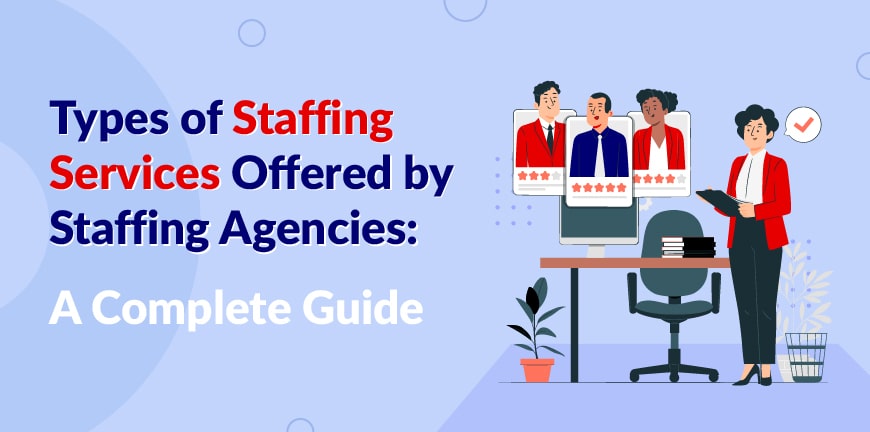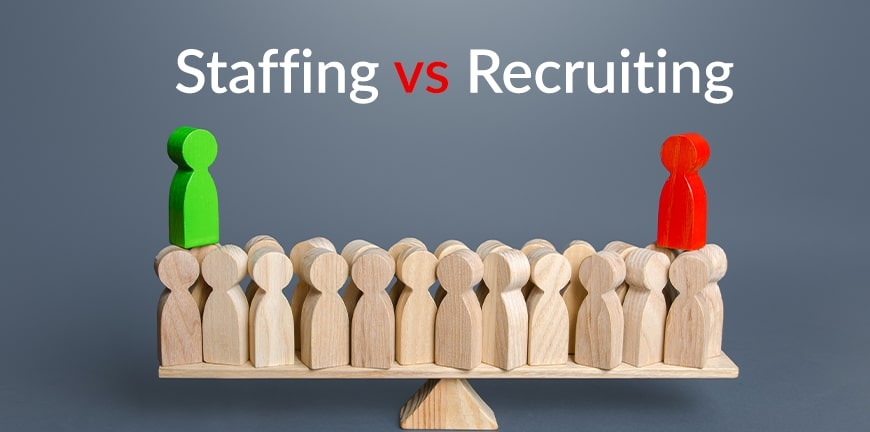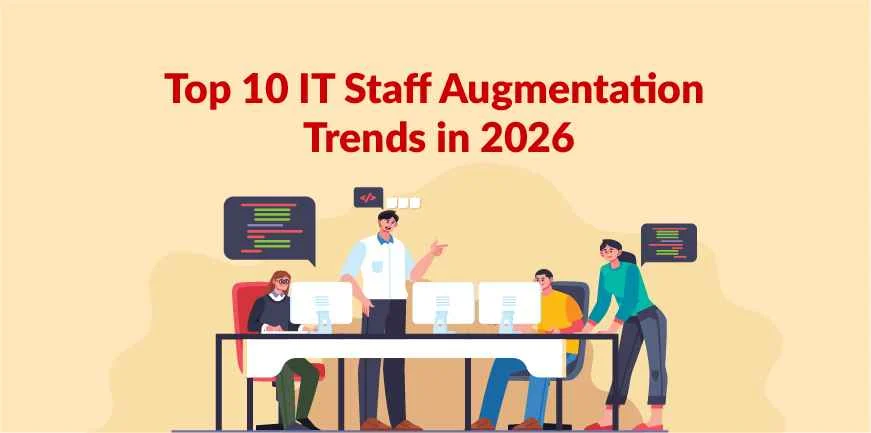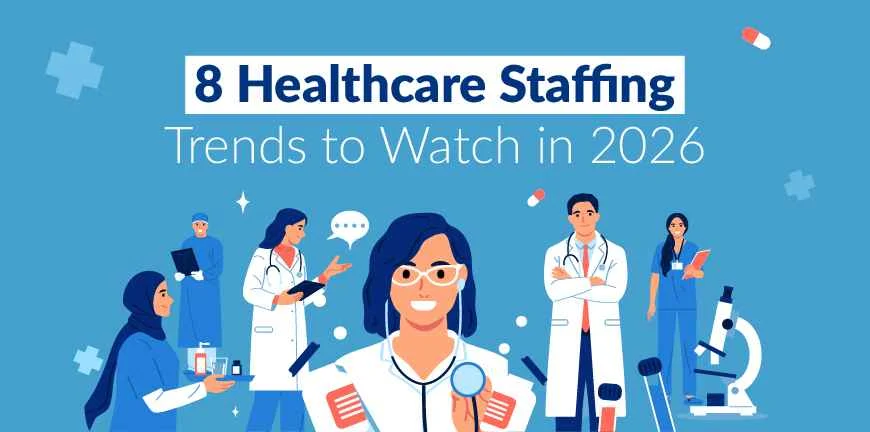
PLI Schemes & Talent Demand in India’s Semiconductor Drive
04/07/2025
What Is Financial Management? Definition, Types, Functions & Best Practices
08/07/2025Business priorities are evolving rapidly due to a competitive market pushing companies to move away from traditional methods of running operations, and staffing is no exception. Companies, whether startups, SMEs, or Fortune 500, are partnering with reputed staffing agencies to fill workforce gaps for the short and long term.
Although most staffing agencies offer different types of staffing services, it is up to the company to make the right choice that fits its business goals and objectives. Let’s discuss the 9 types of staffing services that companies can choose to achieve the best outcomes in terms of candidate quality and cultural fit.
What are Staffing Services?
A simple definition of staffing services states, ” Staffing services act as a proxy to employers to help them fill a job vacancy, either temporary or permanent, through a systematic hiring process”.
Staffing services encompass an entire employment cycle:
- Sourcing
- Screening and Interview
- Final selection
- Onboarding and Document Verification
- Training
- Retention
The types of staffing services opted by companies are companies vary based on their hiring needs, available funds, and business goals.
By leveraging extensive networking, databases and industry expertise, staffing agencies streamline the end-to-end hiring process for all types of companies & establishments, ensuring the right talent is scouted and hired in a short duration.
In most cases, these efforts are targeted towards maintaining a healthy pipeline of talent which can be tapped at any time.
The factors that drive companies to finalise the choice of a staffing solution include:
- Business Needs and Workforce Gaps
- Cost and Budget Considerations
- Industry Expertise
- Speed and Flexibility of Service
- Quality and Reliability of Talent Pool
- Compliance and Legal Support
To help organisations meet their unique hiring demands, talent acquisition agencies such as ALP Consulting provide different types of staffing services.
Here are the 9 types of staffing services that most companies prefer to fill their workforce gaps with the best available talent:
1. Temporary Staffing
It is one of the most common types of workforce solutions used by companies to hire staff during emergencies for a short duration. This mode of hiring talent offers perks like flexibility, cost-effectiveness, high ROI, etc.
Temporary staffing is an ideal sourcing model when the project deadline is fast approaching but the workforce is not sufficient, full-time employees are not available for some reason, or during short-term project execution where specialised expertise is needed. Additionally, temporarily staffed workers are not usually eligible for perks like health insurance, bonuses, etc.
2. Contract Staffing
These types of staffing are ideal when companies are looking to hire workers with specialised skills for a fixed duration. Contract staffing helps industries and establishments gain instant access to skilled professionals without offering long-term commitment. Some examples of contract staffing include independent consultants, temp-to-hire workers, and project-based contracts.
These types of workforce solutions require a clear definition of the scope and the duration of the project. Also, the payroll management of contract employees is usually managed by the staffing service providers or the contractors who provide contract workers to perform certain tasks.
3. Permanent Staffing
It involves hiring professionals & entry-level employees on a long-term basis, usually for a permanent role with a predefined notice period. Companies use these types of staffing solutions when they require employees on a full-time basis to carry out daily tasks and responsibilities.
Among the list of staffing services, permanent staffing mandates companies to provide benefits like insurance coverage, retirement plans, and career growth opportunities. The permanent staff selection process will be more extensive when compared to other types of workforce solutions since the role requires specialised skills and contributes to business growth.
4. Master Vendor Services
It is a unique type of staffing solution where a single agency or service provider takes complete responsibility for managing all contingent staffing requirements. When companies use master vendor services as their staffing model, they don’t have to bother hiring multiple agencies to manage recruitment efforts.
These types of workforce solutions help companies gain immediate access to a large database of talent in a short span without a substantial investment. This staffing model ensures the recruitment process is streamlined as per the company’s business needs and expected project outcomes.
5. Project-Based Staffing
It has become one of the most popular types of staffing solutions in recent times. Here, the employees are hired temporary basis to carry out a particular project. The workforce hired under this model will be paid till the project is completed, and once the handover is completed, the services will be discontinued.
The project-based staffing is frequently used in software development, marketing, construction, etc. In this staffing mode, employees follow a goal-oriented approach to work on their project-related tasks.
Are you looking for: Project Based Recruitment Services
6. Staff Augmentation
It is a flexible staffing model that allows companies to hire experts with specialised skills to carry out a specific project for a fixed duration. Staff Augmentation is an ideal staffing method that helps in scaling a team without the promise of long-term commitment. These types of staffing models are ideal for hiring talented professionals to carry out IT projects.
7. Virtual Staffing
Virtual staffing is one of those types of staffing solutions that takes out geographical limitations, enabling companies to hire employees from any corner of the world. Here, the employees will be hired either temporarily or permanently to work in a remote setup.
This approach allows employers to gain access to services of a wide talent pool across the globe, helping them fill positions of niche roles and positions that require specialised expertise and knowledge.
8. Direct Hire staffing
Although various staffing services require the direct involvement of staffing agencies in decision-making, in direct-hire staffing, it’s just the opposite. In the direct-hire staffing model, the employer directly hires the candidates to fill a vacancy but asks staffing agencies to run the hiring process and negotiate the negotiations to finalise job offer with terms and conditions.
9. Freelance Staffing
It involves hiring professionals to carry out critical or non-critical tasks on a project-to-project basis. These types of workforce solutions help companies gain instant access to experts with specialised skills at much lower costs compared to permanent staffing.
What are the Benefits of Using Professional Staffing Services?
Here are the key benefits of using various types of staffing services:
1. Gain access to a wide talent pool
Staffing agencies typically have a large database & network of passive and active candidates seeking employment. By availing of different types of staffing services, companies can tap into a wide talent pool to run their business operations smoothly without disruptions and ensure continued growth.
2. Minimise Hiring Costs
Managing staffing requirements through an in-house recruitment team can be expensive and reduce profitability. However, parenting with a staffing agency that offers different types of workforce solutions can reduce costs significantly, as the entire sourcing to onboarding operations will be carried out by the firm at reduced charges without compromising on the quality of the hire.
3. Reduced Hiring Risks
All types of staffing agencies handle the entire recruitment process from sourcing and screening to onboarding and running thorough background checks. This elaborate process will ensure chances of bad hires are almost reduced to zero.
4. Flexibility and scalability
Most types of staffing services offer flexibility and scalability according to hiring needs and market demands. Companies can scale up and down their candidate requirements without getting into any long-term commitments with the staffing agency.
5. Administrative efficiency
By partnering with agencies that offer different types of staffing services, companies can free up their internal resources from administrative duties and ask them to focus more on strategic planning and employee engagement activities.
How Staffing Agencies Match Talent with Business Needs?
Here are the steps carried out by staffing agencies to hire top candidates for companies:
1. Needs Analysis
Agencies that offer standard and customised types of staffing services have detailed mutual discussions and meetings with clients to understand and finalise job roles, staff volume, job description (JD), company culture, and project timelines, ensuring the recruitment process aligns with business objectives & hiring timeline.
2. Sourcing & Talent Pool Development
The staffing team will utilise large candidate profile databases, nationwide networks, job portals, and recruitment marketing to develop a robust pool of qualified candidates with diverse expertise and skill levels suitable for passive and active hiring.
3. Candidate Screening and Evaluation
The seasoned staffing team will finalise a list of candidates that match perfectly with the JD via interviews, technology-driven background checks, skill assessments, and reference verification.
4. Client-Candidate Matching
The staffing professionals will align candidates’ strengths, preferences, expertise levels, experience, & career goals with the company’s expectations, ensuring a high potential for performance and retention.
5. Interview Coordination and Selection Support
The staffing crew will organise interviews between clients and shortlisted candidates, provide feedback, and assist in final decision-making and selection. Post-decision, the agency will provide job offers and initiate negotiations.
6. Onboarding & Ongoing Support
The staffing agencies will facilitate smooth onboarding, manage documentation, and maintain post-placement communication to ensure a smooth transition of the candidates towards their employment journey.
Conclusion
Although there are different types of staffing services, companies and staffing agencies must work together to find the best method by matching staffing requirements with short and long-term business goals.
Additionally, the choice of staffing agency also plays a huge role in achieving the best outcomes in terms of quality of hires and business continuity. If you are looking to partner with a top staffing agency in India to meet all your workforce requirements, then ALP Consulting seems to be the best choice.
Frequently Asked Questions (FAQs)
1. What are the 4 main types of staffing?
The 4 major types of staffing services include temporary, permanent, contract-based, and master vendor services. They meet various business needs across different industries and roles.
2. Which staffing service is best for startups?
The types of workforce solutions that startups benefit most from are temporary or contract staffing, as they don’t involve long-term commitments.
3. How much do staffing services cost?
The costs vary based on the type of staffing service chosen, role type, industry, and contract terms.
4. What’s the difference between staffing and recruiting?
Typically, recruitment solutions are used for finding candidates for long-term roles, whereas staffing provides temporary or flexible workforce solutions for short-term or project-based needs.
5. Do staffing agencies handle payroll?
Yes, most staffing agencies manage payroll, tax deductions, benefits, and compliance for placed temporary or contract employees.
6. How to choose the right staffing service?
To choose the right staffing service, companies must evaluate agency expertise, industry experience, speed, talent quality, compliance support, and ability to meet their specific staffing needs.
7. What are the key factors to consider when choosing a staffing service?
The key factors to consider when choosing various staffing services include budget, hiring urgency, agency reputation, recruitment process quality, industry specialisation, and post-placement support services offered.
8. What are the 7 important functions of staffing?
The 7 important functions of staffing include manpower planning, recruitment, selection, training, placement, performance appraisal, and employee development. These functions ensure effective workforce management and utilisation.
9. What are the three types of staffing policies?
The three types of staffing policies include ethnocentric (home-country staffing), polycentric (host-country staffing), and geocentric (global talent strategy).
10. What is staffing in HRM?
Staffing in HRM involves identifying, acquiring, and managing talent to ensure the right people fill the right roles.
Contact Us For Business Enquiry

Kasthuri R
Kasthuri R is the Co-Founder & Executive Director at ALP Consulting, bringing over 23 years of experience in search, staffing, and HR consulting. She has been instrumental in driving ALP’s recruitment, employee leasing, and executive search practices across diverse industry verticals. With deep expertise in talent acquisition, HR strategy, and operational management, Kasthuri has built scalable, client-focused solutions that enhance workforce efficiency. Her strategic leadership continues to steer ALP Consulting toward innovation and excellence in people management.




